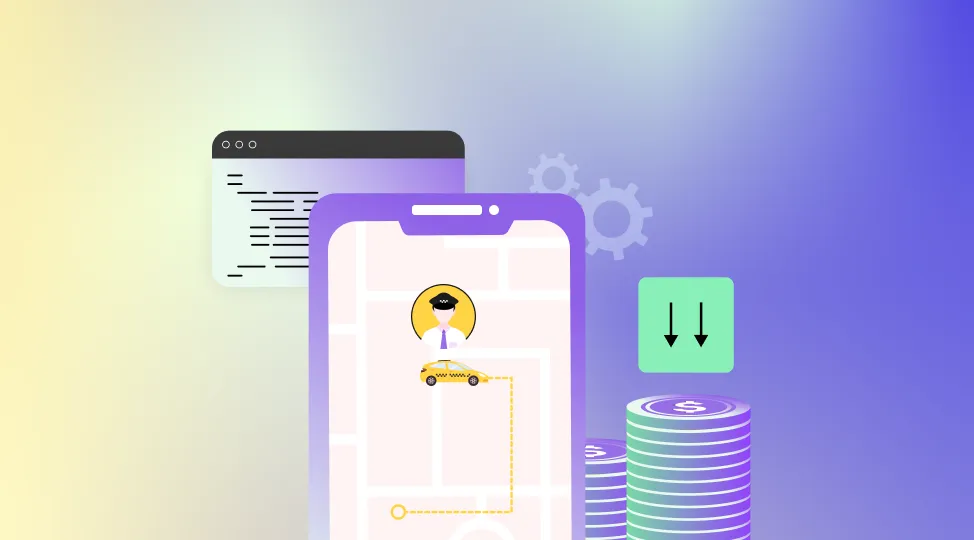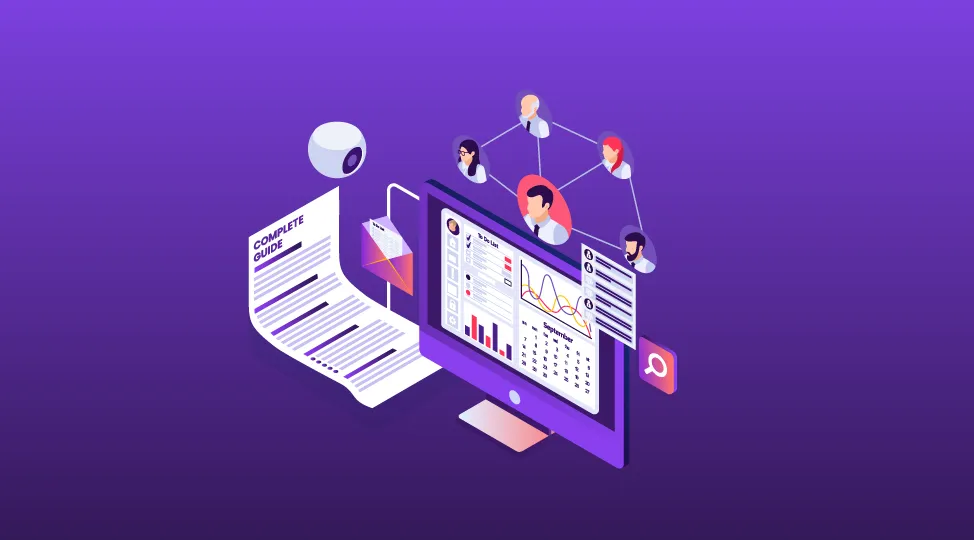It has been a few years since the marketing strategies in businesses sufficed for a specific pool of physically available resources only. With growing mobile internet users around the globe, operating businesses at a local scale is like limiting yourself to serving a specific group of
customers. To facilitate expansion, there was a dire need to exploit the benefits of mobile applications that have changed how we do business.
With over 5 million mobile apps competing on about 3.5 billion smartphones, it is evident why even the most prominent brands are turning to mobile apps for business growth.
These platforms give you an omnichannel approach to foster a value-added business relationship, earning market visibility, brand recognition, and loyal customers: the three most important pillars of business growth.
For an easy read, we have divided this blog into two broad categories -
- Making you familiar with the business benefits of mobile apps;
- How some market giants have profited from mobile apps.
Benefits of Mobile Apps in Transforming Business
Access your Customer
For your business to grow, you need to take your products right into the
customers' palms.
Specifically, that's exactly what a salesman does, and now it can be handled virtually by an app. Mobile platforms help you tailor how you market or promote each product or strategize which audience you want to target.
With a mobile app, you can make your presence in the market space by attracting the eyeballs of your target audience.
Materializing the awareness into revenue shall need deeper analysis and
exploration of the digital business landscape, but it's worth an investment.
Awareness in Market
While announcing new product launches, you may always want a more extraordinary outlook to boost your sales. While a website fails to inform consumers of this, a mobile app can quickly notify users in real time through attractive push notifications.
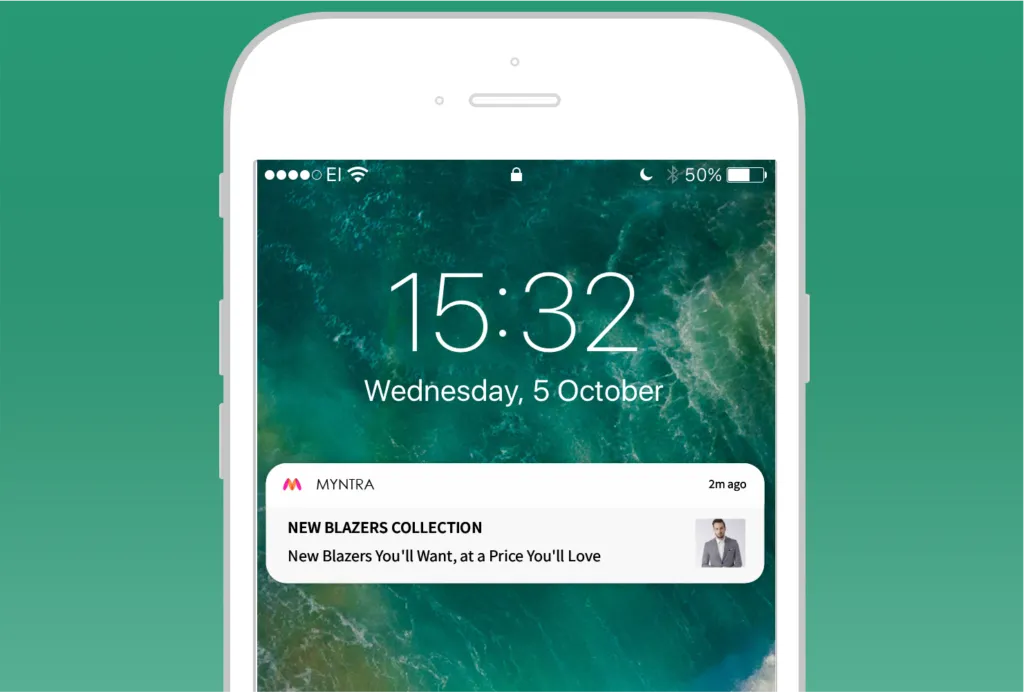
Apart from just transactions relating to your business, mobile platforms give you more ways to interact with your customers: online contests, flash sales, seasonal promotions, conducting surveys, etc.
You can generate great insights through these exercises, which help design better business models. Overall, a user-friendly and interactive mobile app enhances your brand's visibility and recognition among users.
Digital stats help understand the customers better
Understanding customer metrics is essential to devising marketing methods; you can map the entire customer-business connection with real-time data analytics.
It lets you decide which customers to engage in, which products to sell more often, and how to drive customers toward a specific commodity.
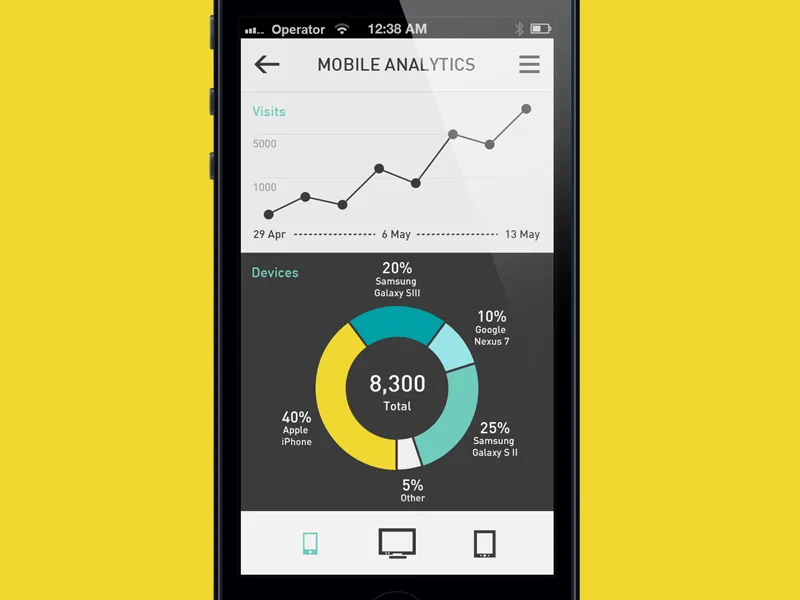
Nonetheless, with digitization, you systematically adapt your business to the needs and demands of the market.
Data obtained from these interactions can be augmented to discover more edges in your business or can be segmented too to help classify your audience and product groups into better categories.
One App = Multiple Services
Have you ever considered recharging your phone, making transactions, listening to music, watching live TV, streaming videos, and playing video games on a single platform?
Yes, that's what makes business on apps so great.
Rather than investing in different departments to manage each sector, the app gives you the perfect one-stop tool to manage, extending your service bandwidth.
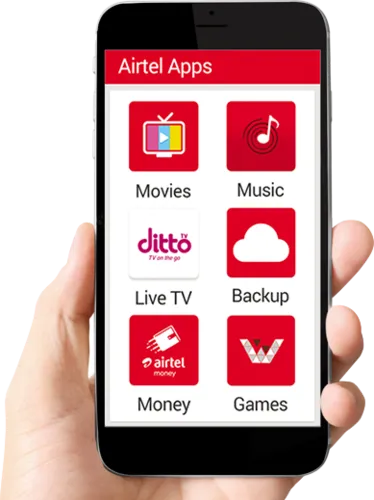
Multi-tasking MyAirtel App
Usually, low-cost and standard phones suffer from storage problems due to rapid media sharing through social media.
So, instead of installing separate apps for songs or recharge, a single app that caters to all operations shall be more often preferred by any consumer.
Growing User Base
Digital platforms allow you to engage in product-related activities like payments, recharge, and e-commerce within your app.
It provides 1:1 interaction with your customers, helping you to squeeze out more user acquisition with minimal operating costs.
Also, the growing mobility population is fueling businesses through apps, making your products accessible to them in convenient ways.
Time & Location Constraints
Retail-shop chains usually depend on the location population to gain customers until now.
Highly reputed chains like Big Bazaar, Walmart, Reliance Trends, Pantaloons, and many more have moved to app platforms to bring their sales, schemes, and products with a tap on the mobile screen.
Clients accessing your exclusive products and services enhance a loyalty bond that converts into revenue generation.
Thus, smartphone applications are the best platform for user acquisition and retention.
Retention Plan: Loyalty Programmes
You may be familiar with club membership schemes you may have subscribed to at any time.
Loyalty programs are just like that: Gifting users with incentives to make the consumers keep on using the service and, as a result: repeatedly purchase from your app!
Subscription, renewal, and bonanza are some favorite tactics implemented quite frequently to retain invaluable customers.
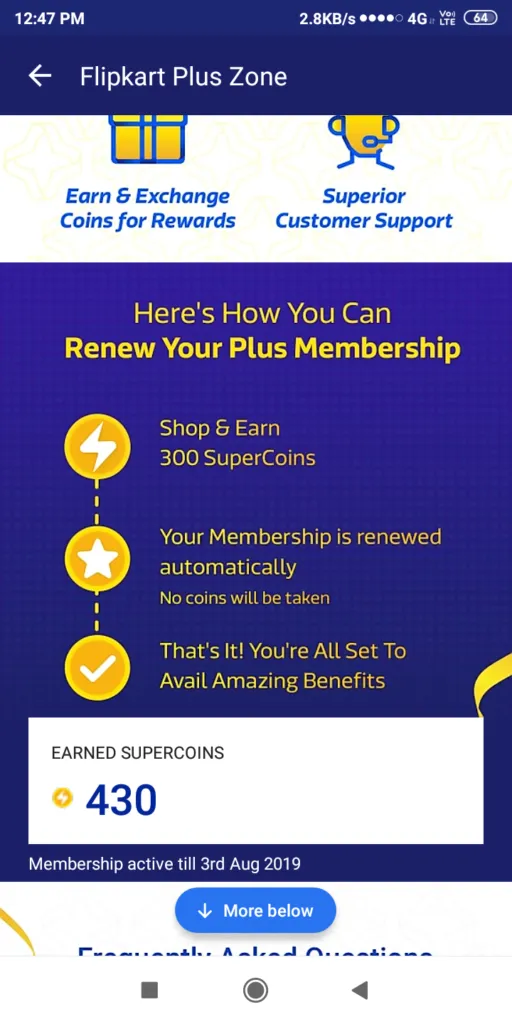
Companies often design multi-tiered loyalty programs (like VIP, Platinum, and Gold memberships) to target different sections of consumers according to purchase capacity, age groups, etc.
Partnering with another company, you can also give inclusive offers to your customers solely: "a value-added" policy.
Managing your employees
Besides customer interactions, workforce management is essential while strengthening your business operations.
Connecting the user needs and distributing them among the different expertise sections requires excellent effort.
An app can smartly generate and manage tasks with only one operator to feed the necessary information. It's more trustworthy because it can evaluate workflow faults, system inefficiencies, and management.
Such data-driven analysis is necessary if you want to storm the competition!
Here's How Some Market Giants Have Profited from Mobile Apps
Done with the ways apps have been helping the business world!
Let's see how different companies and enterprises have used this platform to solve their problems and experience growth.
The Pizza Competition: Domino's vs. Pizza Hut
Revenue is the money received from customers after selling goods and services.
Moreover, to make it straightforward for you to understand, take the reference of the top line item on an income statement, and subtract all costs and expenses to arrive at the net income. What you are left with now is your revenue.
In 2008, when Domino's stocks hit huge setbacks, it thought of inspiring ways to get above the ruins. Among other bold steps, Domino's switched to digital transformation empirically, and the result we all are witnessing - a skyrocketing growth!
And within a year or so, Domino's developed a Pizza Tracker tool that tracks your pizza from when it's ordered to when it is eaten.
Pizza selection, toppings, and add-ons were mobilized inside the app, improving its image into a consumer-friendly interface.
Between 2011 and 2017, Domino's online orders rose from 25% to 60% of its sales. It is precisely where Pizza Hut's overall share fell from 25% to a meager 14.5% in 2015.
The company's dependency on 'dining-in' assets has continuously been outweighed by rapid mobility solutions by Domino's, as shown below in this graph -
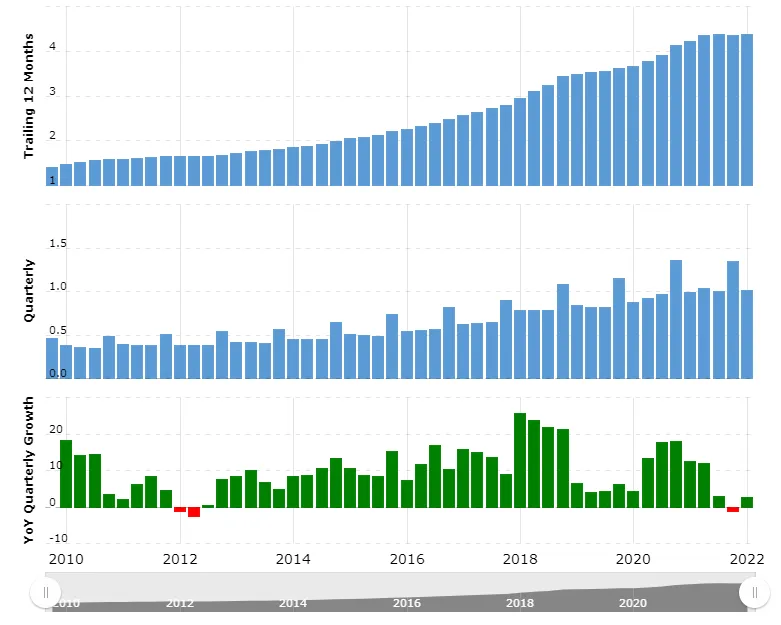
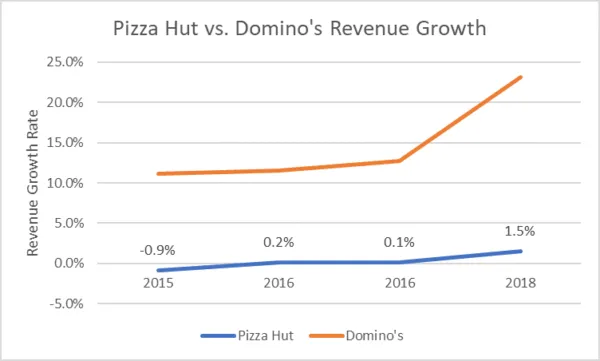
Domino's Pizza Inc's March 31, 2022 revenue was USD 1.011 billion for the first quarter. That's a significant increase, i.e., 2.79% year-over-year. And if you see it for the whole year, it was USD 4.385 billion, a 3.71% increase.
Again, if you saw the same chart for its annual revenue in 2021, it was USD 4.357 billion, an increase of 5.83%from 2020.
Similarly, Domino's Pizza Inc's annual revenue in 2020 was USD 4.117 billion, a massive increase of 13.78% from 2019. And Domino's Pizza Inc's annual revenue in 2019 was USD 3.619 billion, a 5.42% increase from 2018.
Realizing the digital acumen of Domino's, Pizza Hut's parent company Yum! announced a $130 million turnaround investment in assets and technology.
To help build a comprehensive digital service with a robust delivery mechanism, Pizza Hut has partnered with GrubHub , Telepizza, and Quikorder globally.
Also, its dining-in assets are being partially transformed into Delco units that can take the order and deliver it simultaneously.
Starbucks Reward Programme
Starbucks, known for its exciting loyalty rewards programs, has the highest number of loyal app users, confirmed by Starbucks CFO Scott Maw himself in a JPMorgan forum.
He further emphasized an increased revenue of $2.65 billion, with their membership growing to more than 25%: 16 million members.
Loyalty programs include:
- Certain rewarding features like earning two stars for every dollar they spend.
- Free in-store refills.
- Special member offers/events.
- The ability to pay by phone and order ahead.
Through this program, Starbucks made the users spend more: making up more than approx—39% of the sales in the whole chain.
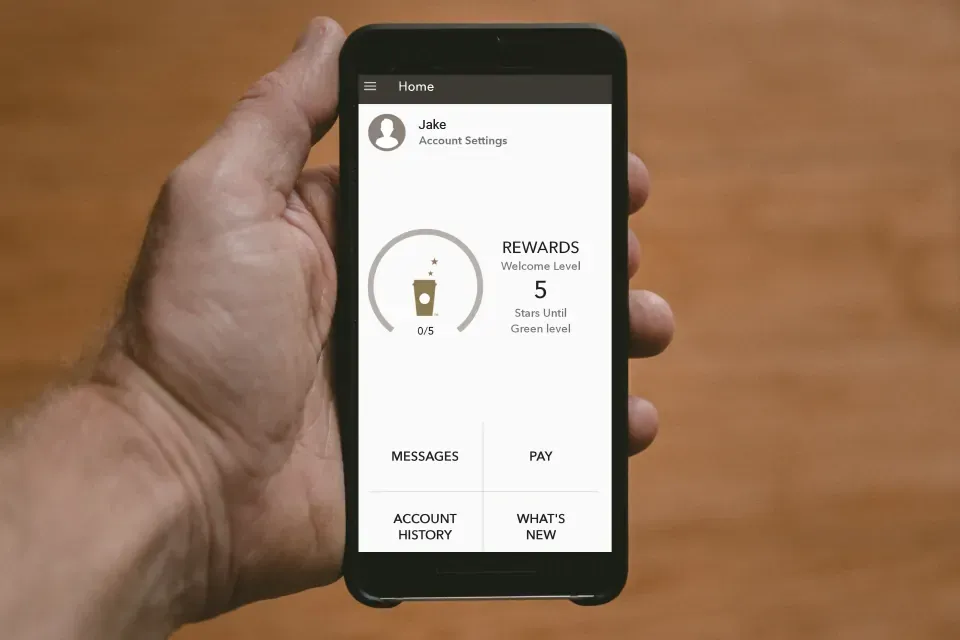
Coupling the rewards feature with ordering and payment from the same app with free Wi-Fi sign-ins at its stores keeps the Starbucks app alive on the user's phone.
These tactics have generated Starbucks a monstrous 14.2 million active reward users in the US in 2018's Q2, an 11% rise in a single quarter.
Starbucks plans to revamp its existing app users by dividing the current reward users into Green and Gold levels, where existing users must redeem their membership by paying. The stars shall get doubled up in return, which you can use as incentives.
The rewards program has been customized for different regions, and the offers have also been apt to the demographics.
Such globalized personalization is possible only through mobile apps interface.
Hence, by digitally keeping its users engaged, Starbucks has drastically improved its cost to acquire customers giving it more arms to invest in marketing and production efforts.
Paytm
With cashless payments gaining momentum, especially recently in India – Paytm , e-commerce, and digital wallet company like PayPal . It used unique strategies to gain and retain consumers and merchants. It has over 15 million registered merchant clients under its umbrella.
Easy onboarding has broadly benefited Paytm's quest to acquire merchants who accept payments through Paytm.
Merchants signing up for this app don't have to have a bank account registered. The Paytm e-wallet facilitates bank purposes digitally: accepting and purchasing through the wallet feature.
Not only this, but Paytm has also copied PayPal's strategy to instigate the
current users to send money to contacts who are non-users of Paytm by
rewarding both with cashback.
The non-users, in turn, have to sign up to the Paytm app to accept the money and get rewarded too!
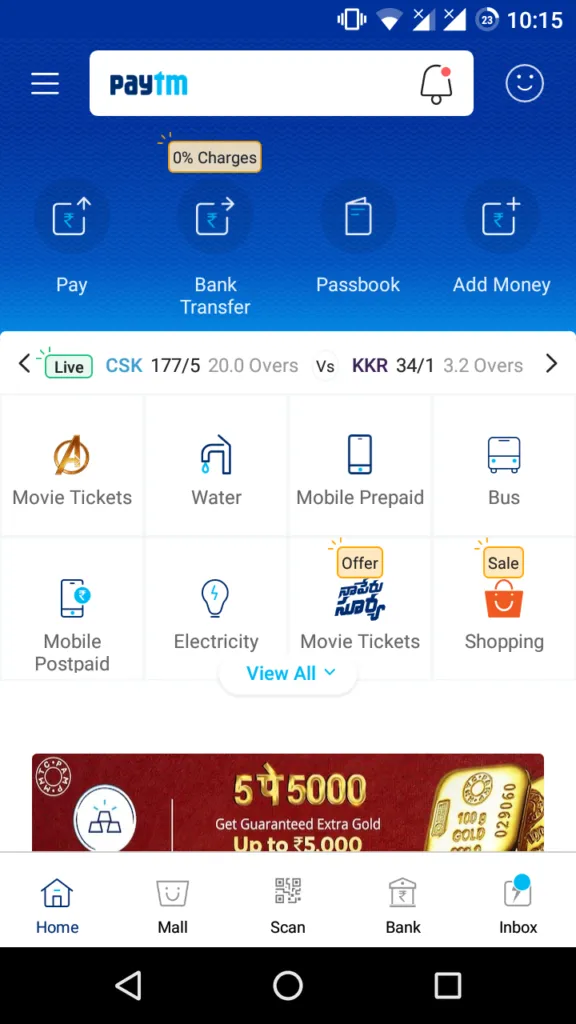
Through its mobile app, Paytm not only supports 1:1 transactions but also live scores of sports, booking trains, flights, buses, and even online ordering, mobile recharges, etc.
By increasing its bandwidth of uses, Paytm has emerged as a "Power App," i.e., an app through which one can perform every task they wish.
One unique strategy in Paytm's app design is that the sign-out option is
deeply embedded within the app the user doesn't usually reach. Thus, they remain logged in most of the time.
Amazon
Amazon, often termed 'Godfather' in the e-retail market, has helped revolutionize m-commerce/mobile commerce globally.
Relying less on brick-mortar assets, Amazon's continual investments in its mobile app research have put it at the helm of the retail market for a long time.
In 2015, Amazon initiated a bold user acquisition campaign by rewarding a user $5 for referring a contact (reportedly, on average, 85% of internet users believe in recommendations from their contacts).
It resulted in a crazy jump from 43 million in 2015 to 67 million users by June 2016: the "rewarding" investment paid off well!
Rapid user growth encouraged Amazon to relentlessly innovate its social platforms, loyalty programs (like Amazon Prime incentives), and users engaging seasoned sales, contests, and gaming to have the user play with its app now and then.
These innovative mobility solutions have helped Amazon fuel its agenda
constantly.
Conclusion
With so many small and large enterprises extensively using mobile apps, it's exciting and rewarding if you cautiously invest in building an app that users would love to explore. Such an app can be your face to your consumers like Zomato, Blinkit, Swiggy, Rapido, Uber Eats. Freekaamaal, Etsy, etc.
Suppose you're out and ready to launch the next big business idea that you believe will change the lives of millions of people's user experience with a secure and interactive mobile app. In that case, you can always reach out to any mobile app development company with enough expertise in delivering a mobile app and a business strategy that works.
Also Read:- Top Android Application Development Trends in 2023
Tags
Digital Transformation
Mobile app Development



 Facebook
Facebook
 Twitter
Twitter
 LinkedIn
LinkedIn
 Pinterest
Pinterest








